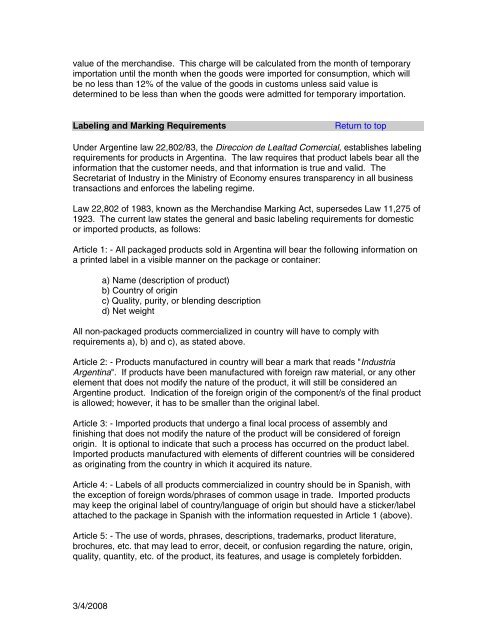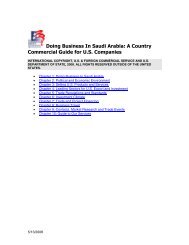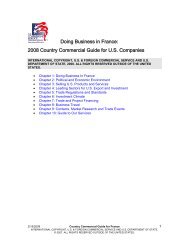Create successful ePaper yourself
Turn your PDF publications into a flip-book with our unique Google optimized e-Paper software.
value of the merchandise. This charge will be calculated from the month of temporary<br />
importation until the month when the goods were imported for consumption, which will<br />
be no less than 12% of the value of the goods in customs unless said value is<br />
determined to be less than when the goods were admitted for temporary importation.<br />
Labeling and Marking Requirements Return to top<br />
Under Argentine law 22,802/83, the Direccion de Lealtad Comercial, establishes labeling<br />
requirements for products in <strong>Argentina</strong>. The law requires that product labels bear all the<br />
information that the customer needs, and that information is true and valid. The<br />
Secretariat of <strong>In</strong>dustry in the Ministry of Economy ensures transparency in all business<br />
transactions and enforces the labeling regime.<br />
Law 22,802 of 1983, known as the Merchandise Marking Act, supersedes Law 11,275 of<br />
1923. The current law states the general and basic labeling requirements for domestic<br />
or imported products, as follows:<br />
Article 1: - All packaged products sold in <strong>Argentina</strong> will bear the following information on<br />
a printed label in a visible manner on the package or container:<br />
3/4/2008<br />
a) Name (description of product)<br />
b) Country of origin<br />
c) Quality, purity, or blending description<br />
d) Net weight<br />
All non-packaged products commercialized in country will have to comply with<br />
requirements a), b) and c), as stated above.<br />
Article 2: - Products manufactured in country will bear a mark that reads "<strong>In</strong>dustria<br />
<strong>Argentina</strong>". If products have been manufactured with foreign raw material, or any other<br />
element that does not modify the nature of the product, it will still be considered an<br />
Argentine product. <strong>In</strong>dication of the foreign origin of the component/s of the final product<br />
is allowed; however, it has to be smaller than the original label.<br />
Article 3: - Imported products that undergo a final local process of assembly and<br />
finishing that does not modify the nature of the product will be considered of foreign<br />
origin. It is optional to indicate that such a process has occurred on the product label.<br />
Imported products manufactured with elements of different countries will be considered<br />
as originating from the country in which it acquired its nature.<br />
Article 4: - Labels of all products commercialized in country should be in Spanish, with<br />
the exception of foreign words/phrases of common usage in trade. Imported products<br />
may keep the original label of country/language of origin but should have a sticker/label<br />
attached to the package in Spanish with the information requested in Article 1 (above).<br />
Article 5: - The use of words, phrases, descriptions, trademarks, product literature,<br />
brochures, etc. that may lead to error, deceit, or confusion regarding the nature, origin,<br />
quality, quantity, etc. of the product, its features, and usage is completely forbidden.












